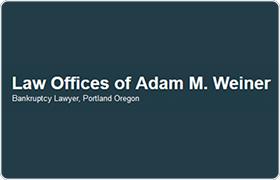Multnomah County, OR Bankruptcy Lawyers, page 2
Sponsored Law Firm
-
 x
x

Click For More Info:
-
Law Offices of Adam M. Weiner
8624 SE 13th Ave Portland, OR 97202» view mapBankruptcy & Debt Premier Bankruptcy Attorney
Life doesn’t always have to be hard. Consult with a bankruptcy attorney who looks out for your best interests. Call today to begin the process for a fresh financial start.
503-719-5123
Includes: Bankruptcy Litigation, Commercial Bankruptcy, Consumer Bankruptcy, Dissolution
Conde T. Cox
Litigation, Prosecution, Credit & Debt, Bankruptcy, Federal
Status: In Good Standing Licensed: 44 Years
Daniel Lawrence Steinberg
Civil Rights, Credit & Debt, Collection, Bankruptcy
Status: In Good Standing Licensed: 25 Years
Direlle Calica
Contract, Indians & Native Populations, Commercial Bankruptcy, Business & Trade
Status: Inactive Licensed: 17 Years
Douglas Ricks
Corporate, Bankruptcy, Credit & Debt, Consumer Protection
Status: In Good Standing Licensed: 20 Years
Evan Kelly Meltzer
Land Use & Zoning, Corporate, Contract, Commercial Bankruptcy
Status: In Good Standing Licensed: 20 Years
Gabriel Matthew Weaver
Construction, Litigation, Lawsuit & Dispute, Bankruptcy
Status: In Good Standing Licensed: 34 Years
Gabriel Matthew Weaver
Litigation, Estate, Business, Bankruptcy
Status: In Good Standing Licensed: 34 Years
Gerald Ramsay Pederson
Landlord-Tenant, Employment, Family Law, Bankruptcy, Collection
Status: In Good Standing Licensed: 28 Years
 Adam M. Weiner Portland, OR
Adam M. Weiner Portland, OR Practice AreasExpertise
Practice AreasExpertise
